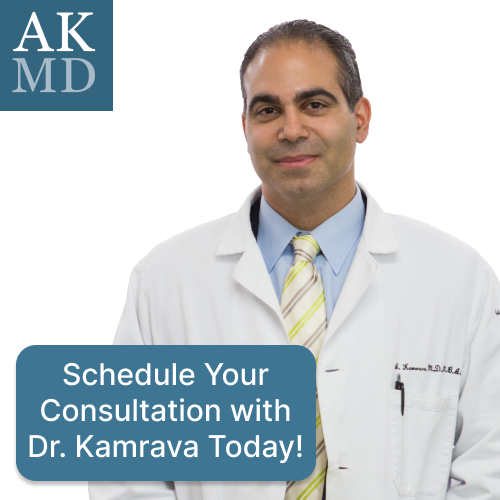Colon cancer is a type of cancer that forms in the large intestine. When polyps and tumors form along the intestinal lining and are not treated, they may develop into cancerous masses. Early detection of colon cancer is vitally important because the disease develops slowly and it is treatable if detected in its early stages.
Dr. Kamrava is fellowship-trained and board-certified in colon and rectal surgery. The advanced care of colorectal cancers is part of his extensive ongoing research, and he is certified in advanced laparoscopic and robotic surgical techniques.
Who Is At Risk?
Anyone may develop colon cancer, but there are a number of factors that may increase your risk for the disease. If someone in your family has been diagnosed with colon cancer, you’ll want to start your screening process for the disease 10 years before the age that he or she was diagnosed. Obesity has also been linked to colon cancer, so altering your diet and lifestyle may reduce your risk.
The occurrence of colon cancer in men is slightly higher than in women, and among ethnic groups, African American individuals are more likely to develop the disease. However, the colon cancer may develop regardless of these risk factors. At the age of 50, individuals should get their first colonoscopy and get additional screenings every 10 years.
 Colon Cancer Symptoms
Colon Cancer Symptoms
Unfortunately, the early stages of colon cancer often have no symptoms. Once symptoms develop, the disease is more advanced. Contact a colorectal specialist as soon as possible if you have any physical symptoms that last for an extended period of time. Colon cancer symptoms include bloody stool, abdominal pain, diarrhea, unusual bowel habits, weakness, fatigue, rectal bleeding, and sudden weight loss. Screenings for colon cancer before any symptoms develop is the best way to detect the disease early.
Screenings and Colonoscopy
When colon cancer is detected early, it is very treatable. During a colonoscopy, the small and large intestine will be examined with a colonoscope. The visual inspection checks your colon for ulcers, polyps, tumors, or any other abnormalities. Colon tissue may also be removed and biopsied. The process helps determine whether or not pre-cancerous or cancerous cells are present in the colon.
Colon Cancer Frequently Asked Questions
If you are concerned about your health and would like to find out more about colon cancer, you may not know where to start. To help you investigate the disease, here are answers to questions about colon cancer. Dr. Kamrava will be happy to address additional questions or concerns you may have. Please feel free to call our office at 424.279.8222 to schedule an appointment.
Q: How common is colon cancer?
A: Colon cancer is one of the most common cancers among both men and women. It is the second-leading cause of cancer deaths in the United States. Early detection is extremely important because the disease is curable when discovered early in its growth phase.
Q: What are colon cancer symptoms?
A: When colon cancer has progressed, there are a number of uncomfortable physical symptoms. Consult a colorectal specialist who can help diagnose your medical condition if you experience bloody stool, abdominal pain, fatigue, or extreme weight loss.
Q: At what age should I get a colonoscopy?
A: Individuals should get colon cancer screenings and colonoscopies starting at age 50. African Americans should get colonoscopies starting at age 45, since investigations have shown they have a higher risk of developing the disease. Follow-up screenings are necessary at least once every 10 years. If you have a family member who has been diagnosed with colon cancer, you should have your first colonoscopy 10 years before his or her age at the time of the diagnosis.
Q: Are colon polyps always cancerous?
A: Colon polyps are not always cancerous, but they are generally assessed as pre-cancerous growths that require removal. A biopsy should be taken of the polyp to help determine the most appropriate treatment.
Q: What are the best treatment options for colon cancer?
A: Standard methods for treating colon cancer are surgery, chemotherapy, and radiation. If you are diagnosed with colon cancer, Dr. Kamrava will discuss the best treatment options based on your individual case.
Call Today to Schedule a Colon Cancer Consultation With Dr. Kamrava
To learn more about colon cancer, schedule a consultation with Dr. Kamrava. Since early detection is a critical component of successfully treating the disease, you’ll want to be examined as soon as possible by a colorectal specialist. Contact our office today at 424.279.8222!
Next, learn about rectal cancer.




